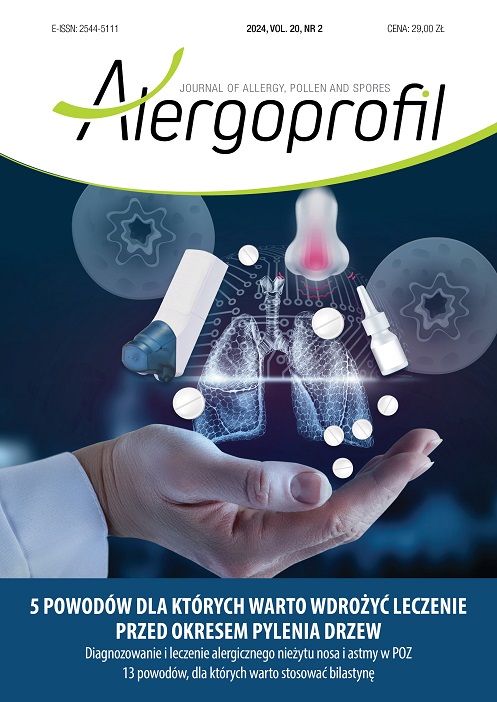5 reasons why it is worth to start treatment of allergic rhinitis before the pollen season Review article
Main Article Content
Abstract
Allergic rhinitis (AR) is defined by the combination of symptoms from the upper respiratory tract including: nose itching, blockage, sneezing, watery discharge, resulting from an IgE-dependent allergic reaction after exposure of an atopic patient to an allergen. AR is one of the most common clinical manifestations of allergies. Diagnosing the disease and implementing effective and safe treatment is the key to achieving good symptom control and improving the patient’s quality of life. According to international standards for the diagnosis and therapy of allergic rhinitis (ARIA), second-generation antihistamine-drugs (e.g. desloratadine, levocetirizine, bilastine) are first-line drugs in previously untreated patients with allergy symptoms, regardless of the AR’s severity. In the case of chronic AR and more severe symptoms of seasonal AR, in clinical practice we use the synergy of combining intranasal glucocorticosteroids with oral or intranasal antihistamine-drug. The combination of a glucocorticosteroid with an intranasal antihistamine (e.g. mometasone with olopatadine) is highly recommended in treatment standards, and in addition to its effect on the symptoms of allergic rhinitis, it significantly reduces the severity of symptoms of coexisting allergic conjunctivitis. Initiating therapy before the expected start of the pollen season guarantees achieving a good clinical effect.
Downloads
Article Details
Copyright: © Medical Education sp. z o.o. This is an Open Access article distributed under the terms of the Attribution-NonCommercial 4.0 International (CC BY-NC 4.0). License (https://creativecommons.org/licenses/by-nc/4.0/), allowing third parties to copy and redistribute the material in any medium or format and to remix, transform, and build upon the material, provided the original work is properly cited and states its license.
Address reprint requests to: Medical Education, Marcin Kuźma (marcin.kuzma@mededu.pl)
References
2. Samoliński B, Krzych-Fałta E, Piekarska B et al. ARIA-2019 – zintegrowana opieka w alergicznym nieżycie nosa – Polska. Alergologia Polska – Polish Journal of Allergology. 2019; 6(4): 111-26.
3. Kurowski M, Kuna P, Górski P. Montelukast plus cetirizine in the prophylactic treatment of seasonal allergic rhinitis: influence on clinical symptoms and nasal allergic inflammation. Allergy. 2004; 59(3): 280-8.
4. Kitamura Y, Mizuguchi H, Ogishi H et al. Preseasonal prophylactic treatment with antihistamines suppresses IL-5 but not IL-33 mRNA expression in the nasal mucosa of patients with seasonal allergic rhinitis caused by Japanese cedar pollen. Acta Otolaryngol 2012; 132(4):434-8.

